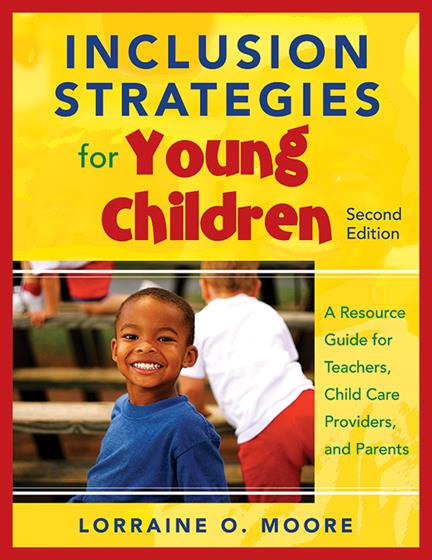Preface
Acknowledgments
About the Author
Introduction
1. Working With Young Children
Major Findings From Brain Research
"Whole Child" Perspective
Developmentally Appropriate Practice
Cycles of Learning
Phase I: Awareness
Phase II: Exploration
Phase III: Inquiry
Phase IV: Utilization or Application
Environmental Considerations
Testing and Labeling of Young Children
Working With Parents
Teaching From the Heart
2. Inclusion: The Right to Equal Educational Experiences
Children With Special Needs
Types of Special Needs
Labeling of Young Children
Legislation That Supports Inclusion
Inclusion
Benefits of Inclusive Education
Barriers to Inclusive Education
Summary
3. General Strategies for Working With Young Children
Expectations
Time
Environmental Conditions
Nutrition and Learning
Multi-Sensory Activities
Basic Categories of Modification
Brain Balancing
4. Communication Strategies
Basic Communication Strategies
Attending Strategies
Listening Strategies
Attaching Meaning to Print and Words
Strategies for Children With a Hearing Impairment
Strategies for Children With a Visual Impairment
Strategies and Information for Children With Limited Speech and Expressive Language
5. Large and Small Motor Development
Strategies for Large Motor Development
Strategies for Small Motor Development
6. Emotional/Social Development
Strategies for Supporting Emotional Development
Strategies for Supporting Social Development
7. Guiding and Modifying Children's Behavior
General Strategies for Guiding Children's Behavior
Strategies for Modifying Children's Behavior
Strategies for Children With Attention Problems
Strategies for Aggressive and Withdrawn Behaviors
Strategies for Problem Solving
8. Preparatory Writing, Reading, and Math Skills
Preparatory Writing and Reading Skills
Preparatory Math Skills
9. Assessing Young Children
Characteristics of Young Children That Affect Assessment
Developmental Patterns
Purposes for Assessing Young Children
Assessment Tools and Techniques
Observation
Interviews
Standardized Tests
Other Assessment Procedures
Assessment of Children With Special Needs
Summary
10. Learning in the 21st Century
Brain Research
Nutrition and Learning
Other Needs of the Brain and Body
Environmental Factors and Learning
Expanded View of Intelligence
Responsibility
Appendix A: Forms and Activities
Form 1: Profile of Development
Form 2: Cycles of Learning
Form 3: Behavior as a Function of the Interaction of the Child in His Environment
Form 4: General Strategies for Working With Young Children
Form 5: Categories of Modifications
Form 6: Creating a Personal Dictionary of Familiar Objects
Form 7: Mazes
Form 8: Learning About Feelings Through Working With Animals
Form 9: Sharing and Talking About Feelings
Form 10: Learning About Feelings Through Dramatic Play
Form 11: Learning About Empathy
Form 12: Settling Conflicts Peacefully
Form 13: Steps for Problem Solving
Form 14: Steps in Changing Behaviors
Form 15: Charting Frequency of Behaviors
Form 16: Child Observation Form
Form 17: Examples of Observation Forms
Form 18: Interview About the Child
Appendix B: Bibliography
Appendix C: Resources
Appendix D: Glossary
Index



